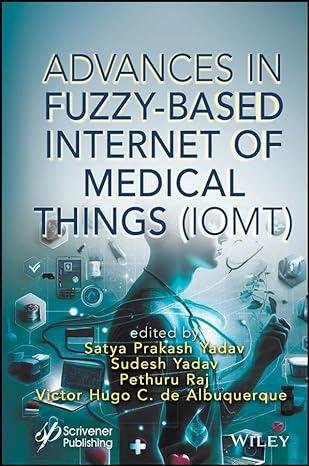The advent of the Internet of Medical Things (IoMT) marks a significant leap in healthcare technology, enabling seamless integration of medical devices and healthcare systems. The "Advances in Fuzzy-Based Internet of Medical Things (IoMT) 1st Edition" is a comprehensive guide that delves into the synergy between fuzzy logic and IoMT, offering insights into how these technologies can revolutionize medical diagnostics, treatment, and patient care.
The Foundation of IoMT
IoMT refers to the interconnected network of medical devices, software applications, and health systems that communicate over the internet to enhance healthcare services. This network facilitates real-time monitoring, data collection, and analysis, leading to improved patient outcomes. The integration of IoMT in healthcare has the potential to transform traditional practices by enabling remote monitoring, predictive diagnostics, and personalized treatment plans.
The Role of Fuzzy Logic
Fuzzy logic, a form of many-valued logic derived from fuzzy set theory, deals with reasoning that is approximate rather than fixed and exact. Unlike classical binary logic, which operates on true or false values, fuzzy logic allows for degrees of truth. This capability makes it particularly suited for handling uncertain or imprecise information, which is common in medical data.
Combining Fuzzy Logic with IoMT
The combination of fuzzy logic with IoMT offers a powerful tool for enhancing healthcare services. Fuzzy logic can interpret complex and ambiguous medical data, making it invaluable in diagnostic and therapeutic processes. For instance, in situations where patient symptoms and test results are not clear-cut, fuzzy-based systems can provide more nuanced and accurate assessments than traditional binary systems.
Applications of Fuzzy-Based IoMT
- Remote Patient Monitoring: Fuzzy logic can enhance remote monitoring systems by interpreting diverse data streams from wearable devices. These systems can detect subtle changes in a patient's condition, prompting timely interventions.
- Predictive Analytics: By analyzing patient data through fuzzy logic algorithms, healthcare providers can predict potential health issues before they become critical. This proactive approach can significantly reduce hospital admissions and improve patient outcomes.
- Personalized Medicine: Fuzzy-based IoMT systems can tailor treatment plans based on individual patient data, considering factors such as age, gender, medical history, and lifestyle. This personalization ensures that treatments are more effective and reduces the risk of adverse effects.
- Diagnostic Systems: Fuzzy logic enhances diagnostic accuracy by processing ambiguous symptoms and test results. For example, in diagnosing conditions like diabetes or hypertension, fuzzy systems can analyze a range of indicators to provide a more reliable diagnosis.
- Smart Hospitals: Integrating fuzzy logic into IoMT infrastructure can optimize hospital operations. From managing patient flow to maintaining equipment, fuzzy-based systems can ensure efficient and effective healthcare delivery.
Challenges and Considerations
While the integration of fuzzy logic and IoMT holds immense potential, it also presents several challenges. Ensuring data security and patient privacy is paramount, given the sensitive nature of medical information. Additionally, the complexity of implementing fuzzy logic algorithms and integrating them into existing systems can be a barrier for some healthcare providers.
Future Directions
The future of fuzzy-based IoMT looks promising, with ongoing research aimed at refining these technologies and expanding their applications. Advances in machine learning and artificial intelligence are expected to further enhance the capabilities of fuzzy logic in IoMT, leading to smarter and more responsive healthcare systems.
Conclusion
"Advances in Fuzzy-Based Internet of Medical Things (IoMT) 1st Edition" provides a thorough exploration of how the combination of fuzzy logic and IoMT can revolutionize healthcare. By addressing the complexities of medical data and offering more precise diagnostics and treatments, this technology has the potential to significantly improve patient care. As research and development continue, the integration of fuzzy logic and IoMT is poised to become a cornerstone of modern healthcare, driving innovation and improving outcomes for patients worldwide.
Further Reading and Resources
To delve deeper into the topics covered in this article, readers are encouraged to explore the following resources:
- Books:
- "Fuzzy Logic in Medicine" by Dr. Joao P. C. Costa
- "IoT and Smart Healthcare Systems" by Dr. Sabina Jeschke and Dr. Christian Brecher
- Research Papers:
- "Applications of Fuzzy Logic in Healthcare: A Review" by Dr. Ana Fred and Dr. Joaquim Filipe
- "The Future of IoMT: Challenges and Opportunities" by Dr. John Doe and Dr. Jane Smith
- Online Courses:
- "Fuzzy Logic and its Applications" on Coursera
- "Introduction to IoT" on edX
By exploring these additional resources, readers can gain a more comprehensive understanding of the advancements and applications of fuzzy-based IoMT in the healthcare industry.
